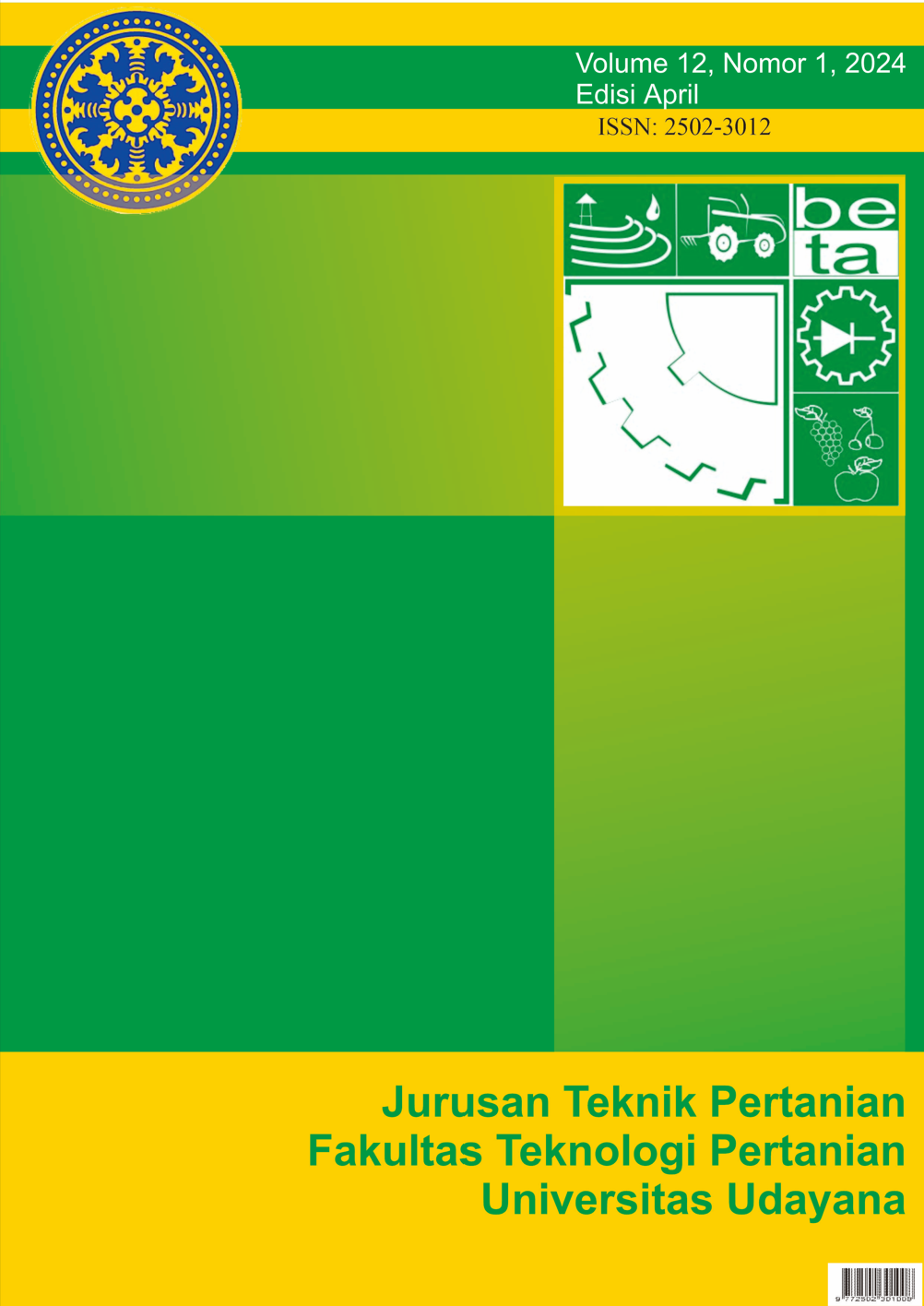Rancang Bangun Traceability Website Sayur Brokoli Berbasis Framework Laravel di BOS Fresh
Abstract
Traceability merupakan metode yang dapat dilakukan oleh pengelola industri pangan untuk memberikan informasi yang terkait produk yang dihasilkan secara keseluruhan. Sistem traceability masih memiliki keterbatasan penyampaian informasi mengenai produk kepada para konsumen khususnya di BOS Fresh. Sehingga, dibutuhkan traceability website yang mampu mengelola serta menyampaikan data tersebut secara digital kepada konsumen. Tujuan dari penelitian adalah merancang traceability website yang baik, responsif, dan mudah diakses. Perancangan traceability website ini meliputi beberapa tahap diantaranya pengembangan website, perancangan use case diagram, perancangan class diagram database, perancangan user interface website, melakukan hosting, hingga tahap pengujian dengan metode white-box, black-box, dan user acceptance testing. Pengguna pada traceability website dibagi menjadi dua, yakni user admin dan konsumen dengan halaman yang berbeda. Pada halaman user admin memiliki beberapa menu seperti login, input data, update data, menghapus data, serta mencetak QR Code. Konsumen hanya dapat mengakses halaman untuk melihat data saja dengan cara memindai QR Code yang telah disediakan. Hasil pengujian metode white-box dengan menguji jalur logika pada bahasa pemrograman mendapatkan interpretasi “Valid” untuk semua variabel pengujian. Hasil pengujian metode black-box dengan menguji seluruh fitur yang dimiliki website mendapatkan interpretasi “Berhasil” untuk semua variabel pengujian. Serta hasil pengujian metode user acceptance testing dengan menguji pengoprasian website mendapat nilai rata-rata 3,48 dengan interpretasi “Sangat Puas”, dengan menguji kelengkapan data mendapat nilai rata-rata 3,57 dengan interpretasi “Sangat Puas”, serta dengan menguji tampilan website mendapatkan nilai rata-rata 3,64 dengan interpretasi “Sangat Puas”. Berdasarkan seluruh hasil pengujian, dapat disimpulkan bahwa traceability website telah berjalan dengan baik, responsif, dan mudah untuk diakses.
ABSTRACT
Traceability is a method that can be used by food industry managers to provide information related to the products produced as a whole. The traceability system still has limitations in conveying product information to consumers, especially at BOS Fresh. So, a traceability website is needed that is able to manage and convey this data digitally to consumers. The aim of the research is to design a good, responsive, and easily accessible traceability website. The design of this traceability website includes several stages including website development, use case diagram design, database class diagram design, website user interface design, hosting, and the testing phase using the white-box, black-box, and user acceptance testing methods. Users on the traceability website are divided into two, it is a admin users and consumers with different pages. On the admin user page, there are several menus such as login, input data, update data, delete data, and print a QR Code. Consumers can only access the page to view data by scanning the QR Code provided. The results of testing the white-box method with logic path testing in programming languages get the "Valid" interpretation for all test variables. The results of testing the black-box method by testing all the features of the website get the interpretation of "Success" for all test variables. As well as the test results of the user acceptance testing method by testing the operation of the website getting an average value of 3.48 with the interpretation of "Very Satisfied", by testing the completeness of the data getting an average value of 3.57 with the interpretation of "Very Satisfied", and by testing the appearance of the website get an average value of 3.64 with the interpretation of "Very Satisfied". Based on all the test results, it can be concluded that the traceability of the website has been running well, is responsive, and easy to access.
Downloads
References
Guntara Putra, D. (2019). Rancang Bangun Sistem Tracking Service Produk Elektronik Pada PT. Samsung Service Center Lampung Menggunakan QR Code Berbasis Web.
Luthfi, F. (2017). Penggunaan Framework Laravel Dalam Rancang Bangun Modul Back-End Artikel Website Bisnisbisnis.ID. In JISKa (Vol. 2, Issue 1).
Murni, S., & Sabaruddin, R. (2018). Pemanfaatan Qr Code Dalam Pengembangan Sistem Informasi Kehadiran Siswa Berbasis Web. In Jurnal Teknologi & Manajemen Informatika (Vol. 4, Issue 2).
Rafi, S. I., & Indahyanti, U. (2022). Women’s Clothing Application by Using Waterfall Method in the Form of Website of Rafika Modes UMKM (Vol. 2, Issue 2).
Resman, K. I. K., Gunadnya, I. B. P., & Budisanjaya, I. P. G. (2020). Rancang Bangun Sistem Informasi E-Commerce Penjualan Ayam Pedaging Berbasis Website di Kabupaten Manggarai Barat.
Saed Novendri, M., Saputra, A., & Firman, C. E. (2019). Aplikasi Inventaris Barang Pada MTS Nurul Islam Dumai Menggunakan PHP dan MYSQL.
Setiyani, L. (2021). Implementasi Cybersecurity pada Operasional Organisasi.
Soler, J., Boada, I., Prados, F., Poch, J., & Fabregat, R. (2010). A formative assessment tool for conceptual database design using UML class diagram. International Journal of Emerging Technologies in Learning, 5(3), 27–33. https://doi.org/10.3991/ijet.v5i3.1402
Sulaiman, I., Yusriana, & Muliawan, W. (2021). Building Cocoa Traceability System Based on Application and QR Code. Jurnal Aplikasi Teknologi Pangan, 10(2). https://doi.org/10.17728/jatp.7549
Suteja, B. R., & Harjoko, A. (2008). User Interface Design for e-Learning System. In Seminar Nasional Aplikasi Teknologi Informasi.
Waspadadi Ligar, B. (2020). Review Pemanfaatan QR Code pada Ketertelusuran Makanan (Food Traceability). https://doi.org/10.32409/jikstik.19.2.2864
Wedhatama, A. (2020a). Bali Organik Subak Company Profile. https://www.baliorganiksubak.com/profile/. Diakses pada 29 Desember 2022.
Yusriana, & Jaya, R. (2022). Digitalisasi SistemTraceability dan Keberlanjutan Agroindustri Pangan: Telaah Kritis Literatur. Jurnal Teknologi Industri Pertanian, 146–155. https://doi.org/10.24961/j.tek.ind.pert.2022.32.2.146












 Jurnal BETA (Biosistem dan Teknik Pertanian)
Jurnal BETA (Biosistem dan Teknik Pertanian)


